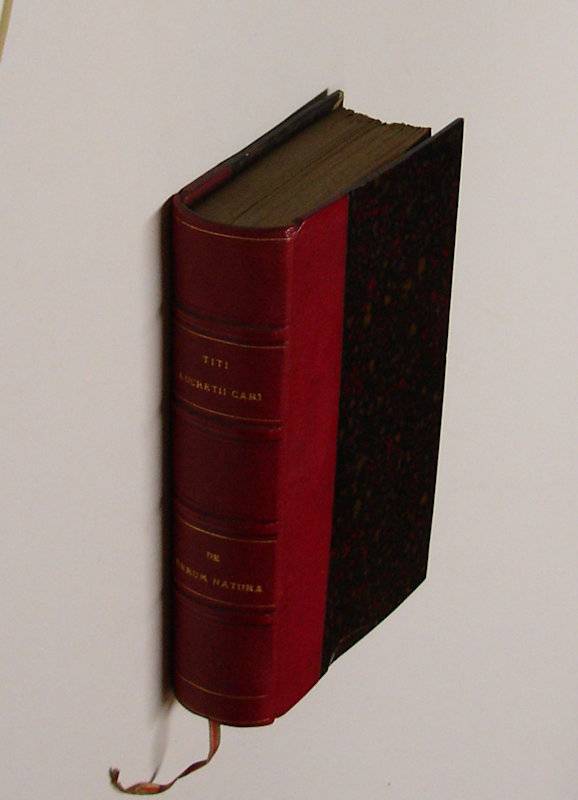LUCRETIUS. Titi Lucretii Cari De rerum natura libri sex. Accedunt selectae lectiones dilucidando poëmati appositae. (Curante Stephano Andrea Philippe).
Paris, (Lutetiae Parisiorum), Typis Josephi Barbou, 1754.
12mo. XXXVI,288 p., frontispiece and 6 plates. Later half morocco. 17.5 cm (
Ref: Gordon 504B; Ebert 12455; Brunet 3,1220; cf. Schweiger 2,576 for the ed. of 1744; Graesse 4,280) (
Details: Nice copy. Red morocco, first half 20th century. Back with 4 raised bands, with gilt fillets and lettering. Marbled boards and endpapers. Thick paper, wide margins, untrimmed. Fine engraved frontispiece and plates designed by Frans van Mieris junior, engraved by Cl. Duflos for Coustelier in 1744, and used again by Barbou for this edition. For an explanation of these mythological plates see the bibliography of Gordon, p. 244. Woodcut printer's mark on the title, depicting an old man who stands in the shade of a vine-entwined elmtree, symbolising the symbiotic relationship between scholar and publisher. The motto is enigmatic: 'Non solus', probably indicating the interdependency of publisher and scholar. Occasional engraved headpieces and woodcut initials. Includes also a tricolour bookmarker. At the end 30 pages filled with 'Variae Lectiones') (
Condition: Some negligible wear to the corners; a hardly visible dent at the lower edge of the front board)
(Note: The Roman poet and philosopher Lucretius was much admired in the age of Enlightenment. 'Virtually every major figure of the period was in some way influenced by Lucretius'. (S. Gillespie and Ph. Hardie, Cambridge Companion to Lucretius, 2007, p. 274). He acted as shield-bearer and mouthpiece of the Greek philosopher Epicurus by explaining in his didactic poem 'De rerum natura' Epicurus' physical theories 'with a view to abolishing superstitious fears of the intervention of the gods in the world and of the punishment of the soul in an after-life'. (OCD 2nd ed. p. 623)
§ This is a line for line re-edition of the Lucretius edition of 1744, published in Paris by A. Coustelier. It was edited by the French scholar Étienne André Philippe de Prétot, 1707-1787. He taught history and geography at the Royal Academy in Paris, and produced for the publisher Coustelier a great number of editions of Latin classics, especially poets and historians. He published also on Roman history, and on geography. He was not an accomplished philologist, so he borrowed the texts for his editions from standard works. In this case he used the text of the edition of the Dutch classical scholar S. Haverkamp, 1684-1742, which was published in quarto, Leiden 1725. Dibdin calls the edition of Haverkamp 'not only a very splendid, but a learned and critical edition'. (Dibdin 2,202/3). Ernesti calls it 'splendissima' (Ernesti, 1,83). Mr. Philippe not only borrowed the text, but his edition is also adorned with the same charming plates as that of Haverkamp, only expertly reduced) (
Collation: frontispiece, a8, b4, c6; plate, A8, B4, C8, plate, D4, E8, F4, G8 (plate after G5), H4, I8, K4, L8 (plate after L1), M4, N8, O4, Plate, P8, Q4, R8, S4, T8 (plate after T1), V4, X8, Y4, Z8, Aa4) (Photographs on request)
Book number: 120272 Euro 350.00
Keywords: (Oude Druk), (Rare Books), Altertum, Altertumswissenschaft, Altphilologie, Antike, Antiquity, Latein, Lateinische, Latin literature, Lucretius, Lukrez, ancient, classical philology, römische Literatur
 LUCRETIUS.
LUCRETIUS.